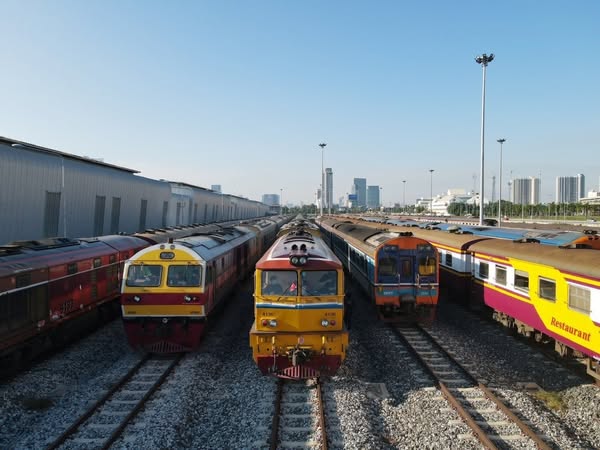Thailand to Scrap Three Train Procurement Projects Worth 57 Billion Baht
The State Railway of Thailand (SRT) is reassessing three major passenger train procurement projects totaling 57 billion baht, following a directive from the Ministry of Transport to shift toward a public-private partnership model. The move, decided during a ministry meeting on July 18, 2025, aims to have private operators manage train services while also handling procurement and maintenance.
The review affects three projects involving a combined total of 479 passenger units. These include: the acquisition of 184 air-conditioned diesel multiple units (DMUs) for commercial service, valued at 24 billion baht; 182 replacement passenger cars for express and special express services, worth about 10.5 billion baht; and 113 diesel-electric locomotives with spare parts, costing 23 billion baht. These projects were originally approved by the Cabinet on May 7, 2015, and July 31, 2018.
The decision to halt and revise these projects stems from efforts to reduce the SRT’s debt burden and the Ministry of Finance’s loan guarantees. Authorities emphasized that any future proposals must ensure cost efficiency, value for money, and compliance with relevant laws and regulations.
According to the SRT, the new study and review are expected to be completed by the end of 2025. The revised plan will then be submitted to the Ministry of Transport and later to the Cabinet for approval within the current government’s term, before the expected dissolution of Parliament in late January 2026. The ministry has urged the SRT to expedite the process, citing an urgent need for new rolling stock as phase one of the double-track rail project gradually opens for service.
Earlier Cabinet resolutions provide the framework for the review. The May 7, 2015, decision concerning the dual-track project between Nakhon Ratchasima and Khon Kaen required the SRT to handle rolling stock investments independently, exploring options such as financial leasing in cooperation with state enterprises or large corporate clients. Revenue from long-term service contracts could then support financing while encouraging private-sector participation in freight and passenger operations.
Meanwhile, the July 31, 2018, Cabinet decision regarding the Den Chai–Chiang Rai–Chiang Khong line stipulated that local manufacturers with sufficient capability should be prioritized for future train procurements, to reduce reliance on foreign suppliers and limit fiscal pressure.
Before this latest decision, the three projects had already been reviewed by several agencies — including the National Economic and Social Development Council (NESDC), the Budget Bureau, and the Ministry of Finance — but progress stalled amid requests for additional information. Then–Deputy Prime Minister and Transport Minister Suriya Juangroongruangkit instructed the SRT to revisit the proposals and provide more comprehensive data to address concerns.
Initially, the SRT board had approved the projects in late 2024 and early 2025, including a plan to acquire 113 diesel-electric locomotives, 182 replacement passenger cars, and 184 bi-mode hybrid DMUs. However, all three approvals are now subject to cancellation and revision under the new private sector participation framework.
